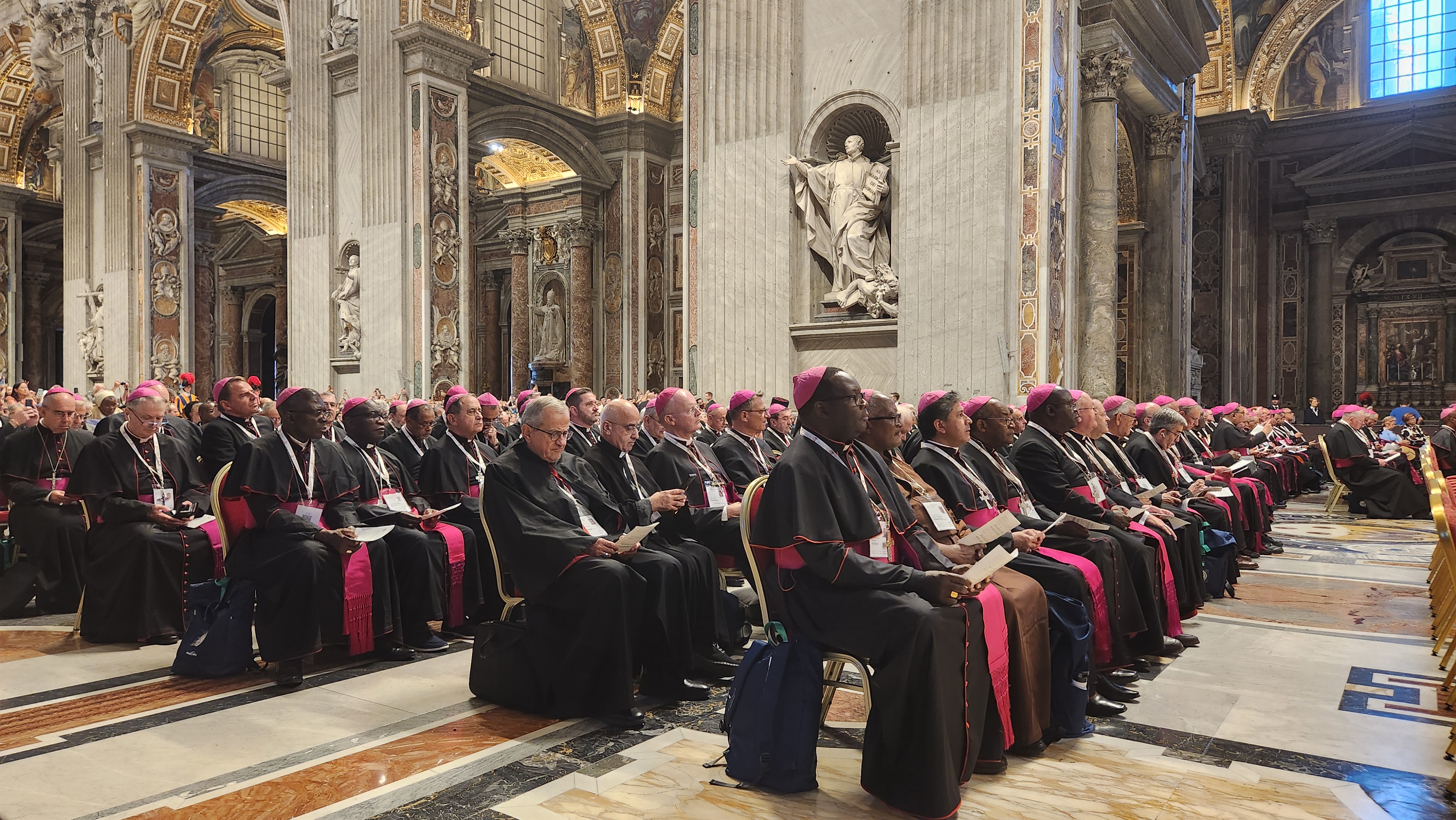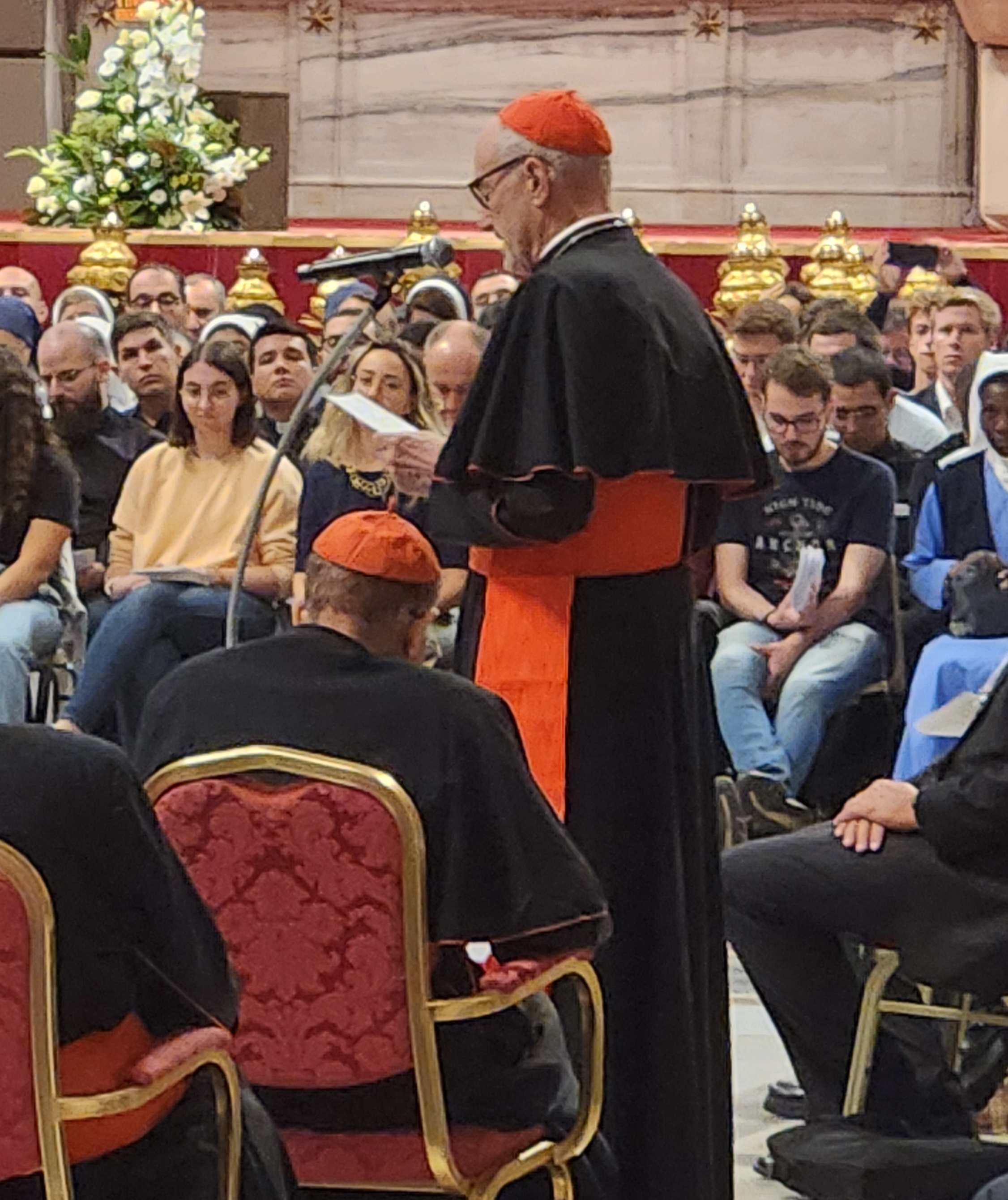Listening to stories, seeking forgiveness, pursuing justice
October 11, 2024 at 12:26 p.m.

Elise Stankus is part of a youth delegation attending the Synod on Synodality underway in Rome and is sharing her experiences with readers of The Monitor.
The Penitential Service in St. Peter’s Basilica on October 1st, the evening before the opening of the Second General Assembly of the Synod, was an intimate encounter with the Church’s darkest corners, as well as a hopeful step towards forgiveness and structural accountability. A crowd of hundreds -- young and old, laypeople and ordained -- gathered to reflect on the Church’s relationship with the most pressing injustices of the modern world, to ask for forgiveness, and to bear witness to the times in which the Church has failed to protect its most vulnerable.
A soaring refrain of “miserere nobis” – “have mercy on us” – was repeated throughout the service, which consisted of personal testimonies, a reflection by Pope Francis, and a Gospel reading.
The sharing of testimonies shed light on the issues of war, unfair treatment of migrants, and the sexual abuse crisis within the Church. Personal, intimate stories were spoken directly in front of Pope Francis, who listened, with a reflective, reverent expression, acknowledging deeply the pain of the people of God.
“I am here as a witness,” one speaker began. In sharing a profound testimony about his personal experience as a victim of sexual abuse at the hands of “a representative of God,” he shed light on one of the darkest moments of his life and of the life of the Church.
Seven cardinals, gathered in the front of the audience, publicly asked for forgiveness for the collective sins against the environment, against women, and against the poor. A lector proclaimed the Gospel of Luke, telling the story of the pharisee and the tax collector, in which the pharisee praises himself before God, while the tax collector repents and humbly seeks forgiveness. “For all those who exalt themselves will be humbled, and those who humble themselves will be exalted.”

In his reflection, Pope Francis spoke of the co-responsibility we are called to as the Body of Christ. “Sisters and brothers,” he said. “No one is saved alone, but it is equally true that the sin of one affects many others. Just as everything is connected in the good, it is also connected in evil.”
However, he also spoke of the great hope that the Synod offers in regard to this holy mission of co-responsibility. “The Church in its essence is a Church that is always relational in its faith and proclamation, and only by healing sick relationships can we become a synodal Church. How could we be credible in our mission if we do not acknowledge our mistakes and stoop to heal the wounds we have caused by our sins?”
The ceremony, a culmination of the retreat for Synod delegates preceding the assembly, was a beautiful gesture towards reconciliation, and provides great hope for the Church’s continued healing.
To watch the Church publicly ask for forgiveness for the times in which it has not protected its people was especially poignant. It attests not only to the radical solidarity of the Gospel, but to the hope and the openness that synodal encounter provides.
I am so grateful to be a witness to this pivotal time in Church history, and I look forward to continuing to see where the Spirit leads. To quote Pope Francis, "Forgiveness, asked for and given, creates a new harmony in which differences are not opposed, and the wolf and the lamb are able to live together!"

Related Stories
Thursday, November 21, 2024
E-Editions
Events
Elise Stankus is part of a youth delegation attending the Synod on Synodality underway in Rome and is sharing her experiences with readers of The Monitor.
The Penitential Service in St. Peter’s Basilica on October 1st, the evening before the opening of the Second General Assembly of the Synod, was an intimate encounter with the Church’s darkest corners, as well as a hopeful step towards forgiveness and structural accountability. A crowd of hundreds -- young and old, laypeople and ordained -- gathered to reflect on the Church’s relationship with the most pressing injustices of the modern world, to ask for forgiveness, and to bear witness to the times in which the Church has failed to protect its most vulnerable.
A soaring refrain of “miserere nobis” – “have mercy on us” – was repeated throughout the service, which consisted of personal testimonies, a reflection by Pope Francis, and a Gospel reading.
The sharing of testimonies shed light on the issues of war, unfair treatment of migrants, and the sexual abuse crisis within the Church. Personal, intimate stories were spoken directly in front of Pope Francis, who listened, with a reflective, reverent expression, acknowledging deeply the pain of the people of God.
“I am here as a witness,” one speaker began. In sharing a profound testimony about his personal experience as a victim of sexual abuse at the hands of “a representative of God,” he shed light on one of the darkest moments of his life and of the life of the Church.
Seven cardinals, gathered in the front of the audience, publicly asked for forgiveness for the collective sins against the environment, against women, and against the poor. A lector proclaimed the Gospel of Luke, telling the story of the pharisee and the tax collector, in which the pharisee praises himself before God, while the tax collector repents and humbly seeks forgiveness. “For all those who exalt themselves will be humbled, and those who humble themselves will be exalted.”

In his reflection, Pope Francis spoke of the co-responsibility we are called to as the Body of Christ. “Sisters and brothers,” he said. “No one is saved alone, but it is equally true that the sin of one affects many others. Just as everything is connected in the good, it is also connected in evil.”
However, he also spoke of the great hope that the Synod offers in regard to this holy mission of co-responsibility. “The Church in its essence is a Church that is always relational in its faith and proclamation, and only by healing sick relationships can we become a synodal Church. How could we be credible in our mission if we do not acknowledge our mistakes and stoop to heal the wounds we have caused by our sins?”
The ceremony, a culmination of the retreat for Synod delegates preceding the assembly, was a beautiful gesture towards reconciliation, and provides great hope for the Church’s continued healing.
To watch the Church publicly ask for forgiveness for the times in which it has not protected its people was especially poignant. It attests not only to the radical solidarity of the Gospel, but to the hope and the openness that synodal encounter provides.
I am so grateful to be a witness to this pivotal time in Church history, and I look forward to continuing to see where the Spirit leads. To quote Pope Francis, "Forgiveness, asked for and given, creates a new harmony in which differences are not opposed, and the wolf and the lamb are able to live together!"











